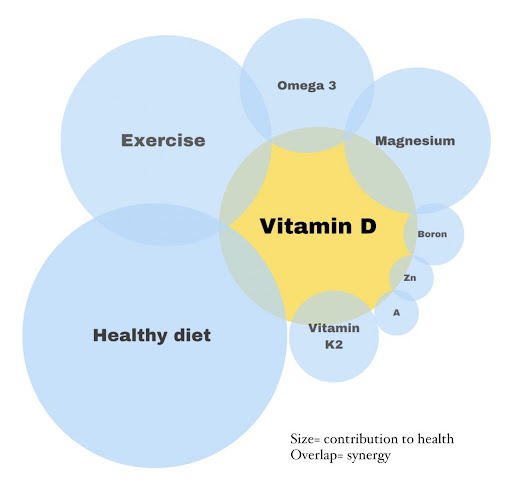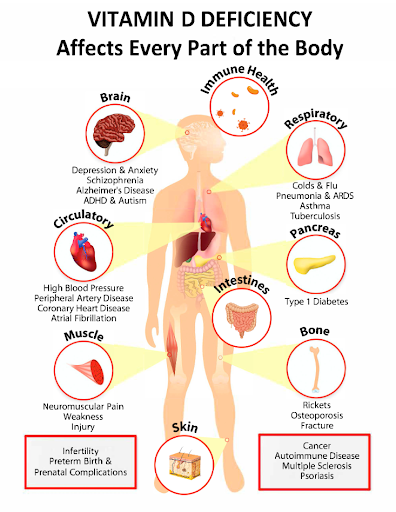Health Benefits of Vitamin D and its cofactors
Last edited, 19 February 2024
This month, we are going to discuss the health benefits of Vitamin D, its cofactors, and how they work together to give us healthier bodies. It’s beneficial for your full understanding to also read some of our previous research articles, especially:
Let’s take a closer look at Vitamin D.
Table of Contents
What is vitamin D?
Most people know that vitamin D can be produced through healthy levels of exposure to the sun. This is why doctors often recommend catching some sunlight every day. However, sunlight is not the only way to get vitamin D into our bodies.
Vitamin D2 and vitamin D3, the two primary types of vitamin D, can be obtained from a number of foods. They cannot, however, be our exclusive source of vitamin D because we often do not eat enough of these items in our diets. Foods like milk, cereal, and some orange juices are fortified with vitamin D2 and vitamin D3 for this reason.
Recent studies have shown that vitamin D is critical for the body and that many of us suffer from vitamin D deficiency without even being aware of it, which has lead to an increase in awareness by doctors and medical experts.
This nutrient supports many health functions of our bodies including both mental health and physical health. As your skin produces vitamin D when exposed to sunlight, it shouldn’t really be called the “sunshine vitamin” but instead the “sunshine hormone” (which just doesn’t sound that good). Also, it is a nutrient – a fat-soluble vitamin that undergoes absorption along with fat in the diet and is stored in the liver and fatty tissues of the body. The most important function of vitamin D in our bodies is the absorption of calcium and phosphorus, both of which are necessary for bone growth.
Vitamin D Cofactors
It is a chemical compound that is bound to a protein and is essential for its biological function. To function properly, the vitamin D needs magnesium, calcium, omega 3, boron, zinc, and vitamin D, A and K2.
Magnesium is one of the most important cofactors and, to put it simply, it’s necessary for vitamin D to bind to its transport proteins and be delivered to the tissues. Magnesium is synergetic to vitamin D3 and increases its benefits up to 30%.
While K2 is another important component needed to work with vitamin D in the metabolism of calcium, calcium is deposited in the teeth and bones rather than the blood vessels. K2 vitamin is essential for bone mineralisation.
The most important food sources of vitamin K2 include fermented dairy products such as cheese, spinach, brussel sprouts, kale salad and also beef liver, which contains 11 mg of vitamin K2 per 100gr. Many food supplements already combine D3 and K2.

Hi! I’m Alona, your expert in beauty and long-lasting vitality, especially when it pertains to hair health.
Feel free to connect with one of IdealofMeD’s specialists today! Don’t hesitate to reach out if you have any questions regarding our vitamins. We’re here to support on your journey to healthier, more vibrant hair!
- we are online
Health Benefits of vitamin D
There are more than 30,000 genes in the human body anvitamin D D supports more than 2,000 of them. Since vitamin D insufficiency has been linked to more than 200 diseases, it is crucial to keep levels at their ideal ranges.
Bone Health Maintenance
Because it controls how well your bones absorb calcium and phosphorus, vitamin D helps to maintain the health and strength of your bones. These two minerals also provide your teeth and skeletal system density and strength.
Supports the Immune System
Supporting the immune system is one of vitamin D’s primary functions and the ability of our natural defence mechanisms to resist infection. Respiratory infections are including pneumonia and bronchitis, as well as other viral infections are often related to vitamin D deficiency. It also assists in stimulating immune cells to recognise and kill cancerous cells.
Reducing Hair Loss
Your skin, nails, and hair are made of a protein called “keratin,” which is produced by keratinocytes. vitamin D aids in the development and reproduction of keratinocytes. Vitamin D is well recognised for its anti-inflammatory and immunomodulating characteristics, which help both men and women stop hair loss.
In other words, taking vitamin D supplements may greatly improve the issue if your hair loss is caused by bodily inflammation, viruses, infections, or post-COVID-19 hair loss. Additionally, studies have linked androgenetic alopecia (AGA), alopecia areata, and low blood vitamin D levels with successful topically applied vitamin D treatments.
Help in Reducing Stress and Depression
Interestingly, vitamin D has an effect on your mental health by preventing stress and depression since it regulates dopamine. Numerous studies have shown that vitamin D supplements can reduce the symptoms of several types of depression, including postpartum and pregnancy depression, bipolar illness, seasonal affective disorder, etc.
Mood Enhancer
The greatest benefit of vitamin D is its ability to enhance mood, since it is crucial for the brain’s production of serotonin. A person with seasonal affective disorder, for example, tends to feel happier when he or she spends some time in the sun since the skin produces vitamin D. You feel better and have less anxiety when your vitamin D levels are higher.
Helps in Reducing Excess Body Weight
Vitamin D supplements may help you lose extra weight. As vitamin D and calcium act as appetite suppressors in your body, research shows that people who take vitamin D during a diet are likely to lose more weight than people who do not.
Control of Insulin Levels
Vitamin D controls your blood sugar levels by regulating the production of insulin in your body. It does this by stimulating the pancreas to increase insulin release and promoting the uptake of glucose by your body cells, which leads to lower plasma glucose levels.
Lowering Blood Pressure
Research has shown that people with hypertension experienced a significant decline in their blood pressure by increasing their intake of vitamin D. Vitamin D is responsible for suppressing the release of renin, a special enzyme, from your kidneys, which constricts your blood vessels that boost your blood pressure.
Prevention of Cancer
Some scientific evidence shows that vitamin D helps in reducing breast cancer, various types of lymphomas, cancers of the colon, ovaries, oesophagus, pancreas, bladder and the progression of prostate cancer. Additionally, studies have shown that when you combine nutrients with fibre, it will reduce the development of polyps, which leads to rectum cancer.
Supporting a Healthy Heart
A significant lack of vitamin D can affect your heart functions. Researchers have found that a low concentration of vitamin D in your blood enhances the risk of a heart attack. It works as a heart tranquilizer, increases heart endurance, and prevents abnormal growth. The thickening of the heart’s walls, which can result in a blockage that triggers atherosclerosis and heart failure, is also avoided.
Maintaining Libido
Low vitamin D level can cause lowering of oestrogen and testosterone in both men and women. Here it is important to make a point that vitamin D is a steroid hormone. Sufficient vitamin D levels are crucial for erectile function. The production of serotonin also leads to a greater sexual desire.

Many researchers agree that there is a direct correlation between vitamin D deficiency and autoimmune diseases, low libido and erectile dysfunction, endometriosis, obesity, type 1 diabetes, infertility, premature birth, cardiovascular disorders, allergies, osteoporosis, cancer, diabetes, eczema, psoriasis and many others.
People who are in the risk group for vitamin D deficiency are of course those who have low exposure to the sun, often due to living in the northern climates with limited amount of sunny days, or in smoggy polluted cities. Furthermore, those who spend the most of their time indoors, such as office employees. Darker skin tones require greater exposure to sunshine to maintain a healthy vitamin D level.
As the body ages vitamin D production drops 4 times from 20 to 70 years old on average.
People who are overweight tend to have low levels of vitamin D than those whose Body Mass Index (BMI) is in the normal range. There are also some generic conditions that do not all the body to produce and metabolise vitamin D.
How to optimise vitamin D level
First of all get your blood tested for serum vitamin D and CRP(C-reactive protein) levels that indicate general inflammation in the body. It’s recommended to check the vitamin D once a year.
Use apps on your phone to track if you are getting enough sunlight based on your age, location and skin tone. D Minder, QSun, Sunday examples of apps that can do this..
Exercise is essential for vitamin D to work effectively. It ensures that the body uses the vitamin instead of storing it in fatty cells.
A balanced diet is as important as sports and movement. Some popular food sources that contain vitamin D include:
- Salmon
- Sardines
- Swordfish
- Cod liver
- Beef liver
- Egg yolk
- Some organically grown mushrooms
- Yoghurt
- Cereals
- Orange juice
As it takes about 9 eggs a day to consume the amount of vitamin D recommended, we cannot rely on food alone. Supplements and sunlight are still vital.
Catch the daylight! Be outside at least 30 minutes a day from 10:00 to 14:00 when your body is not fully covered with clothes or sunscreen. Consider light therapy if being outdoors is not possible for any reasons.
Try to use sunscreen less as it reduces vitamin D production more than 90%, but rather cover your body with clothes and hat and stay in the shade on the most sunny days.
Do not take vitamin D supplements unless it has been recommended by your GP, or you have been tested. If you have any chronic conditions or autoimmune diseases, additional supplements could have adverse effects. Remember about cofactors: Omega 3, K2 and Magnesium. Get advice from your doctor to to whether you need to take the listed cofactors.
The role of Vitamin D3 in the prevention of hair loss
Vitamin D3 plays a crucial role in hair health by promoting the production of keratin, a key protein that forms the structure of hair. Additionally, it aids in the activation of hair follicles, ensuring they remain in the growth phase. Adequate levels of vitamin D3 contribute to the reduction of stress, a common factor in hair loss.
Moreover, D3 supports the absorption of essential minerals like calcium, which is vital for maintaining strong and healthy hair. By fostering a nourishing environment for hair follicles and addressing underlying causes, vitamin D3 acts as a supportive element in preventing and mitigating hair loss. This is the reason why we have added Vitamin D3 to our hair vitamins.
Vitamin D Benefits: Conclusion
We have shown that vitamin D is vital for your bone, muscle and tendon strength, blood vessels’ health by supporting calcium absorption. It plays a significant role in your cognitive functions, mood and energy levels. It’s crucial for libido and reproduction, the immune system and our resilience to many diseases including cancer. And healthy levels of vitamin D is not based on just taking one supplement, but stands on three main pillars: sunlight, movement, and nutrients.







